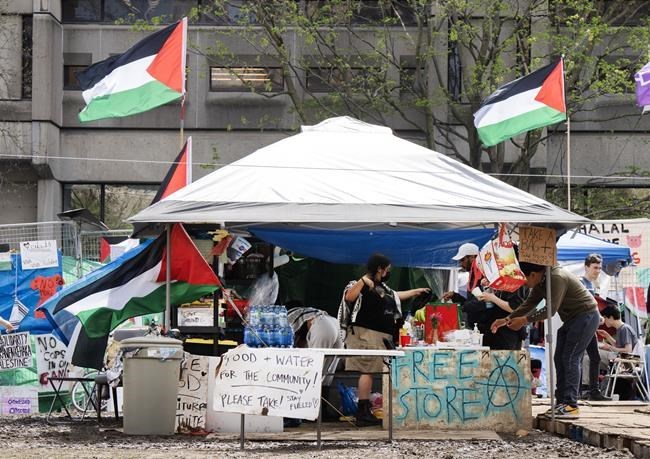MONTREAL — Pro-Palestinian protesters at McGill University have become "occupiers" living in a fortified and barricaded mini-village, a lawyer for the Montreal school argued on Monday as he asked for an injunction to dismantle the more than two-week-old encampment on its downtown campus.
As lawyers for the encampment members defended the right to protest, McGill lawyer Jacques Darche maintained the encampment presents a health and safety risk and is preventing McGill from holding convocation ceremonies on its property.
He told Quebec Superior Court that while universities respect freedom of expression, those who have pitched dozens of tents on its lower field are not mere protesters. "The proper term, in our view, is occupiers or campers," he said.
He said there's a difference between protesting, "with signs and slogans and groups of people, and camping in an encampment, fenced in with a quasi-permanent structure.”
In a judicial application dated Friday, McGill says the encampment is a "security, safety and public health risk" that has escalated tensions on campus. In its filing, McGill cited the "fierce verbal exchanges" between protesters and counter-protesters earlier this month, barrels of possible "human waste" on site, possible fire code breaches and the encampment's potential as a "magnet" for further clashes.
Lawyers representing different groups of protesters countered that there's no proof the encampment is dangerous, nor that there is an urgent need to dismantle it.
Julius Grey, a lawyer representing some of the encampment members, said the right to protest is fundamental and that universities have traditionally been treated differently than other private property when it comes to demonstrations.
"The right of freedom of expression and peaceful assembly must be given significant weight," given the nature of the property he said, adding that a university cannot be compared "to someone's house or living room."
Another lawyer, Alexandre Romano, said the protesters aren't blocking access to the school, have fire extinguishers and emergency exits, and don't cook on site. He noted that police, who are responsible for intervening in dangerous situations, have thus far declined to dismantle the camp.
The protesters fenced off an area and erected tents on April 27, following a wave of similar campus protests in the United States. The protesters are demanding the university divest from companies that are "complicit" in Israel's occupation of the Palestinian territories, and cut ties with Israeli institutions.
Justice Marc St-Pierre repeatedly interjected while Darche was speaking, reminding him that an injunction requires evidence that the encampment not only breaks rules but also presents an urgent need to act.
The judge noted that McGill, by its own admission, has already found an alternative location to hold convocation ceremonies if it can't use its lower field. He also pointed out that there had been no violent incidents at the encampment, including during a recent counter-protest cited by McGill as proof of a potential safety risk.
At one point, the judge also questioned Grey about whether the right to protest also extends to an "occupation."
Darche, in response the judge's questioning, said McGill has an obligation to ensure the safety of everyone on campus, which was impossible to do when encampment members aren't allowing outsiders into their camp and have set up barricades that prevent people from seeing inside.
Grey, who represents a group called Palestinians and Jews Unite, said outside the courtroom it is up to McGill's lawyers to prove the university's claims that the encampment is dangerous. "Demonstrations are a way of informing the public and we have affidavits that show that this demonstration is completely peaceful," he told reporters, adding that the encampment is not permanent.
St-Pierre is expected to deliver a decision as early as Tuesday.
Scott Weinstein, with Independent Jewish Voices Canada, told reporters at the courthouse Monday that doctors and nurses have been present at the encampment, rejecting the university's claim that it is unsafe.
McGill president Deep Saini issued a statement on Friday saying the university is committed to discussing the protesters' concerns in good faith, even if a court order is granted to remove them.
Two McGill students had sought an injunction to force protesters to move at least 100 metres from the university's buildings, but their request was denied on May 1.
On April 30 McGill requested "police assistance" to dismantle the encampment but has not yet received it. According to the court filing, Montreal police told McGill earlier this month that their "criteria for police intervention were not met" and suggested the school try to resolve the matter through dialogue.
Meanwhile, Alberta's government says it will ask the provincial police watchdog to investigate the clearing of two pro-Palestinian campus protest encampments by police with riot gear.
Premier Danielle Smith says reports of potential injuries during the police clearings prompted the call for the Alberta Serious Incident Response Team to make sure there was no unreasonable use of force.
Both the University of Calgary and the University of Alberta have said the encampments on their campuses violated rules against trespassing.
This report by The Canadian Press was first published May 13, 2024.
— With files from Lisa Johnson in Edmonton
Morgan Lowrie, The Canadian Press



